President Emomali Rahmon Addresses Second Dushanbe Conference on International Decade for Action “Water for Sustainable Development”, 2018 – 2028
Read also

Distinguished Heads of Delegation!
Esteemed Ladies and Gentlemen!
Dear Guests!
It is my great pleasure to welcome you to Dushanbe.
Today’s meeting is taking place in accordance with the resolution of the United Nations General Assembly on a comprehensive medium-term review of the goals of the Water Decade.
We believe that it will make a significant contribution to linking the chain of regional and global events to the UN 2023 Water Conference to be co-chaired by the Republic of Tajikistan and the Kingdom of the Netherlands.
Taking this opportunity, I would like to note that next year we will also mark the 20th anniversary of our joint efforts to promote the United Nations Water Agenda.
Over the past 20 years, we have strengthened our joint efforts in implementing initiatives such as the International Year of Freshwater — 2003, the International Decade for Action «Water for Life”, 2005 – 2010, and the International Year of Water Cooperation — 2013.
These global initiatives have facilitated the proactive cooperation of all stakeholders in water resources management and the implementation of projects in the water sector, as well as in the introduction of modern technologies and innovations.
I would like to emphasize the role of our latest initiative — the International Decade for Action «Water for Sustainable Development» in the implementation of internationally concerted goals in this area.
We are confident that the cooperation and expansion of partnerships in the framework of the Decade will enable us to find approaches to achieving the sustainable development goals related to water resources and sanitation.
I would like to take this opportunity to express my sincere gratitude to the leadership of the United Nations, its relevant agencies, in particular the members of the International Advisory Committee on the Dushanbe Water Process and others for their assistance and support in organizing and conducting this Conference.
I would also like to express my sincere gratitude to the UN member states for their continued support of the initiatives and resolutions proposed by our country over the past two decades.
Ladies and gentlemen!
The international community has not yet taken the necessary measures to mitigate the impact of climate change and to adapt to it, and is facing a new threat — the COVID-19 pandemic.
Obviously, during this period, all countries of the world have channelled all means and resources to response to this crisis.
However, we must not forget that the issue of water, due to its vital importance, should always remain a priority.
Experts estimate that the world’s population is expected to reach 9 billion by 2050, which will certainly increase the demand for water many times over.
At the same time, the joint efforts have not yet yielded the desired results, as evidenced by the following figures:
- about 2 billion people in the world do not have access to safe drinking water systems;
- more than 3.5billion people do not have access to basic health services and about 2.5 billion do not have access to basic hygiene services;
- every year about half a million (485,000) people die from water-related infectious diseases.
In this regard, we can state that we have yet to ensure an adequate process of real implementation of the set goals and objectives on access to drinking water and sanitation.
This situation should be of deep concern to us.
With this in mind, the Dushanbe Conference also focuses on the supply of safe drinking water and the linkage between the water and health issues.
Ladies and gentlemen!
Today’s conference will also discuss the close linkage between the water, environment and climate change.
Over the past five years, we have witnessed unprecedented global warming, which has caused droughts and other natural disasters, which have had a negative impact on food security and other sectors of the economy of our countries.
A recent report by the Intergovernmental Panel on Climate Change also highlighted the role of water resources in adaptation to climate change and achievement of sustainability.
It emphasizes that the melting of snow and glaciers and permafrost could have a lasting impact and accelerate the global warming.
These challenges pose a serious obstacle to achieving the SDGs in various countries, including Tajikistan, which is a mountainous country with large water resources, especially glaciers.
For example, as a result of this process, we are witnessing an unprecedented increase in floods, droughts and other water-born natural disasters.
Unfortunately, our country experiences hundreds of millions of U.S. dollars loss annually as a result of such natural disasters.
Water-related natural disasters often result in deaths and significant damage to vital infrastructure.
Another example of this process is the rapid melting of glaciers.
Over the past few decades, more than a thousand glaciers in Tajikistan have fully melted.
The world’s largest continental glacier, Fedchenko, located in our country, has shrunk by 16 km3 in volume and 45 km2 in area.
In this regard, the Government of Tajikistan has adopted its State Program for the Study and Protection of Glaciers to 2030.
In order to follow these processes and take measures to adapt to them, we have established a Glacier Study Center at the National Academy of Sciences.
We are also stepping up our efforts in this direction at the international level.
A few days ago, we held the 2nd meeting of the Water and Climate Coalition Leaders in Dushanbe. At this meeting, we approved the Action Plan with significant results.
At the first meeting of the Water and Climate Coalition Leaders in March last year, I proposed to declare 2025 the International Year of Glacier Protection.
Today, we are undertaking actions at all levels to ensure the implementation of this initiative, and we hope that it will be fully supported by the international community.
Dear participants of the conference!
It is clear that integrated water resources management, including the linkage between the water with energy, food security, and environmental protection, is one of the key tools in addressing these challenges.
This point is also important for Tajikistan.
About 80% of our agricultural output is produced in irrigated lands.
At the same time, more than 98% of electricity in our country is generated by hydropower plants.
Tajikistan ranks sixth in the world in the generation of environment friendly electricity.
In this regard, I would like to draw your attention to the role of water in generation of «green energy» from renewable sources. There is a lot of controversy around this topic today.
However, the World Hydropower Association’s last year report confirmed that strengthening the sector, alongside ensuring economic development, could also play a key role in adapting to the climate change impact.
Currently, the design and building of hydropower plants with a total capacity of 600 gigawatts are ongoing in the world, in addition, there is a need for more than 600 gigawatts of capacity.
The Republic of Tajikistan, which has abundant hydropower resources, can make a valuable contribution in this area.
The total hydropower capacity of our country is 527 billion kilowatt-hours (KWh) per year, of which we have mastered only 3-4%.
Today, we are continuing the construction of the Rogun hydropower plant with a total capacity of 17 billion kilowatt-hours (kW).
The construction of this facility is an outstanding example of our efforts in this direction.
This plant, along with the generation of clean and affordable energy, will also make a significant contribution to the sustainable management of water resources, reducing the risk of floods and droughts, reducing greenhouse gas emissions.
Today, Tajikistan is one of the world’s leading countries in terms of greenhouse gas non-emissions.
It should be noted that most of Roghun’s electricity is expected to be exported to countries in need of energy in the region, which contributes to the socio-economic development of these countries.
At the same time, Roghun and other hydropower plants in Tajikistan will make a significant contribution to strengthening cross-border cooperation, which is one of the most important global issues.
We attach utmost attention to this issue, as cross-border cooperation in the field of water and energy, especially in the Central and South Asia, plays a key role in addressing many issues.
Tajikistan, on the territory of which 60% of Central Asia’s water resources are formed, is always keen to use them effectively for the benefit of all countries in the region.
That is why we give priority to the development of cross-border cooperation under our chairmanship in the International Fund for Saving the Aral Sea.
Just a few days ago, together with our close neighbor, the Republic of Uzbekistan, we launched a joint project to build two hydropower plants in Tajikistan with a total capacity of 320 megawatts (MW), which is a good example of the above-mentioned cooperation.
Ladies and gentlemen!
Another important point that should be of interest to us is the issue of funding.
According to the World Bank, the annual demand for access to safe drinking water and sanitation alone is about US$ 114bn.
In addition, the annual demand for the implementation of the goals of the Paris Agreement in the field of climate is about US$ 7trillion.
It is obvious that developing and least-developed countries do not have such financial opportunities.
Therefore, without the help of developed countries, financial institutions and the private sector we would face many challenges in achieving development goals.
Expanding public-private partnerships is one of the key ways to do this, which will create new opportunities for mobilizing additional investment in the water sector and its infrastructure.
At the same time, there is a need for international cooperation and partnership, including with other development partners and sectors beyond the water, the use of modern technologies, innovation and new scientific and technological research.
These measures are among the factors that can effectively address water issues.
Civil society, especially women and youth, indigenous peoples and local communities, can also make a valuable contribution to this process.
This is the reason these issues are also on the agenda of the Dushanbe Conference. We expect that specific recommendations and messages will be developed based on them.
In order to draw the attention of our public and raise their awareness, we have also enriched the program of the conference by holding a part of the Global Marathon in Tajikistan and the Dushanbe Water Festival, and you have witnessed a real water holiday in our country.
Distinguished participants,
As I mentioned earlier, the Dushanbe Conference has a key role to play in the preparations for the 2023 United Nations Water Conference.
In this regard, the Dushanbe Conference contributes to this important international gathering for coordination and integration of the results of other international events, including the Bonn Dialogue, the 9th World Water Forum, the 4th Asia-Pacific Water Summit in conjunction with the upcoming events — the United Nations Oceans Conference and the 27th Conference of the Parties to the Convention on Climate Change and other regional and international events.
Tajikistan and the Netherlands, as co-chairs of the 2023 Conference in cooperation with the United Nations Department of Economic and Social Affairs and the UN Water mechanism, established a close cooperation with the UN member states and other relevant institutions and organizations in the process of preparing for this conference.
We believe that this Conference, which will be held by the United Nations after almost 50 years, should become a historic event, not only in terms of time, but also with its effective results.
The year 2023 is also important in terms of the mid-term review of the SDGs, and the evaluation of the 1st phase of the Decade “Water for Sustainable Development” will accelerate and encourage efforts to achieve the water related SDGs.
Tajikistan, as co-chair of this important international event, expresses its readiness to cooperate with all member states and other stakeholders.
In this regard, together with the Kingdom of the Netherlands and partners from the United Nations, we will make every effort to make this event a success.
I am confident that the participants of today’s conference will also consistently use this opportunity to facilitate this process and to develop specific messages for the 2023 Conference.
I wish you all, dear participants of the conference, success and good luck, and I hope that your visit to Tajikistan will be memorable.
I thank you for your attention!











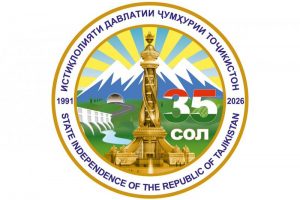 President Emomali Rahmon Approves Emblem for the 35th Anniversary of Tajikistan’s State Independence
President Emomali Rahmon Approves Emblem for the 35th Anniversary of Tajikistan’s State Independence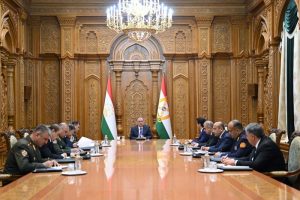 President Emomali Rahmon Holds Working Meeting with Heads of Security and Law Enforcement Agencies
President Emomali Rahmon Holds Working Meeting with Heads of Security and Law Enforcement Agencies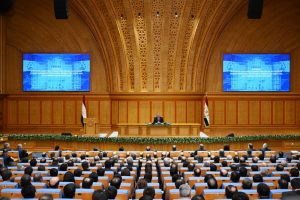 Expanded meeting of the Government of the Republic of Tajikistan
Expanded meeting of the Government of the Republic of Tajikistan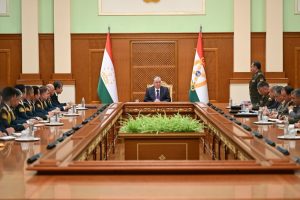 President Emomali Rahmon makes personnel appointments
President Emomali Rahmon makes personnel appointments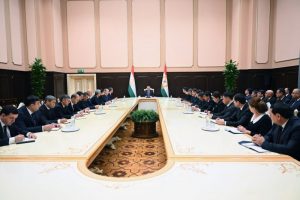 President Emomali Rahmon makes personnel changes in the structures of the Supreme Court, the Higher Economic Court, the Ministry of Foreign Affairs
President Emomali Rahmon makes personnel changes in the structures of the Supreme Court, the Higher Economic Court, the Ministry of Foreign Affairs President Emomali Rahmon makes personnel appointments in the structures of the Ministry of Internal Affairs
President Emomali Rahmon makes personnel appointments in the structures of the Ministry of Internal Affairs President Emomali Rahmon makes personnel appointments
President Emomali Rahmon makes personnel appointments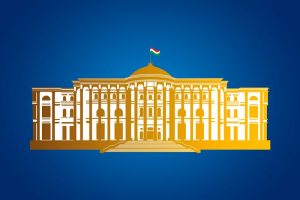 Commentary to orders of the President of the Republic of Tajikistan on the republican competitions «Tajikistan – My Dear Homeland», «Science – Dawn of Enlightenment» and «Book – Dawn of Knowledge» in 2026
Commentary to orders of the President of the Republic of Tajikistan on the republican competitions «Tajikistan – My Dear Homeland», «Science – Dawn of Enlightenment» and «Book – Dawn of Knowledge» in 2026 Emomali Rahmon, Vladimir Putin discuss strengthening strategic partnership between two countries
Emomali Rahmon, Vladimir Putin discuss strengthening strategic partnership between two countries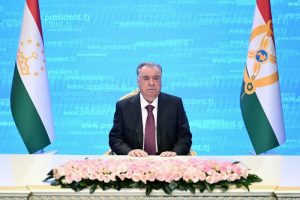 New Year Address of the President of Tajikistan to the Nation
New Year Address of the President of Tajikistan to the Nation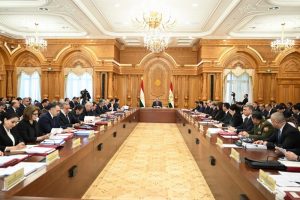 Meeting of the Government of the Republic of Tajikistan
Meeting of the Government of the Republic of Tajikistan














